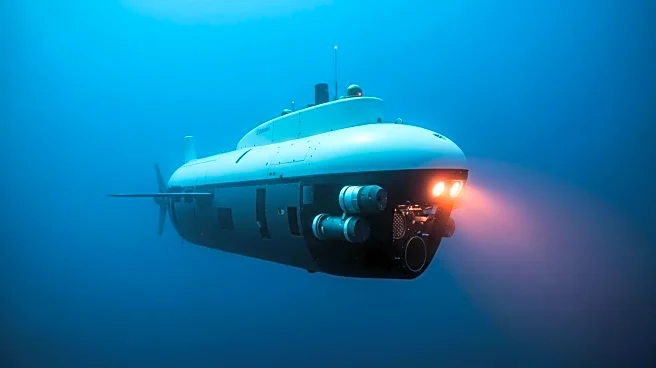What's Happening?
HII's Mission Technologies division and Thales have successfully integrated the SAMDIS 600 synthetic aperture sonar with the REMUS 620 medium unmanned underwater vehicle (UUV). This integration was completed following field exercises and testing at the Defence and Security Equipment International (DSEI) 2025 exhibition in London. The SAMDIS 600 sonar, developed by Thales France, is designed for high-frequency, high-resolution mine detection, classification, and localization. It employs three separate beams to create a multiview sonar picture, enhancing detection probability and reducing false classifications. The integration expands the mine-countermeasures payload options for the REMUS 620, which previously included Kraken Robotics' Miniature Synthetic Aperture Sonar payloads.
Why It's Important?
The integration of SAMDIS 600 with REMUS 620 UUV represents a significant advancement in underwater mine detection technology. This development is crucial for enhancing naval capabilities in mine-countermeasure operations, which are vital for ensuring safe maritime navigation and protecting naval assets. The improved detection and classification capabilities offered by SAMDIS 600 can lead to more efficient and reliable mine-clearing operations, reducing risks to naval personnel and vessels. This technological enhancement may also influence defense strategies and procurement decisions, as nations seek to bolster their underwater surveillance and security measures.
What's Next?
Following the successful integration, HII and Thales may pursue further testing and deployment of the SAMDIS 600-equipped REMUS 620 UUV in various operational environments. This could involve collaboration with naval forces to assess the system's performance in real-world scenarios. Additionally, the integration may prompt other defense contractors to explore similar advancements in synthetic aperture sonar technology, potentially leading to increased competition and innovation in the field of underwater mine detection.
Beyond the Headlines
The integration of advanced sonar technology into unmanned underwater vehicles highlights the growing importance of autonomous systems in defense operations. As these technologies evolve, ethical considerations regarding their deployment and the potential impact on marine ecosystems may arise. Furthermore, the reliance on high-tech solutions underscores the need for robust cybersecurity measures to protect these systems from potential threats.










